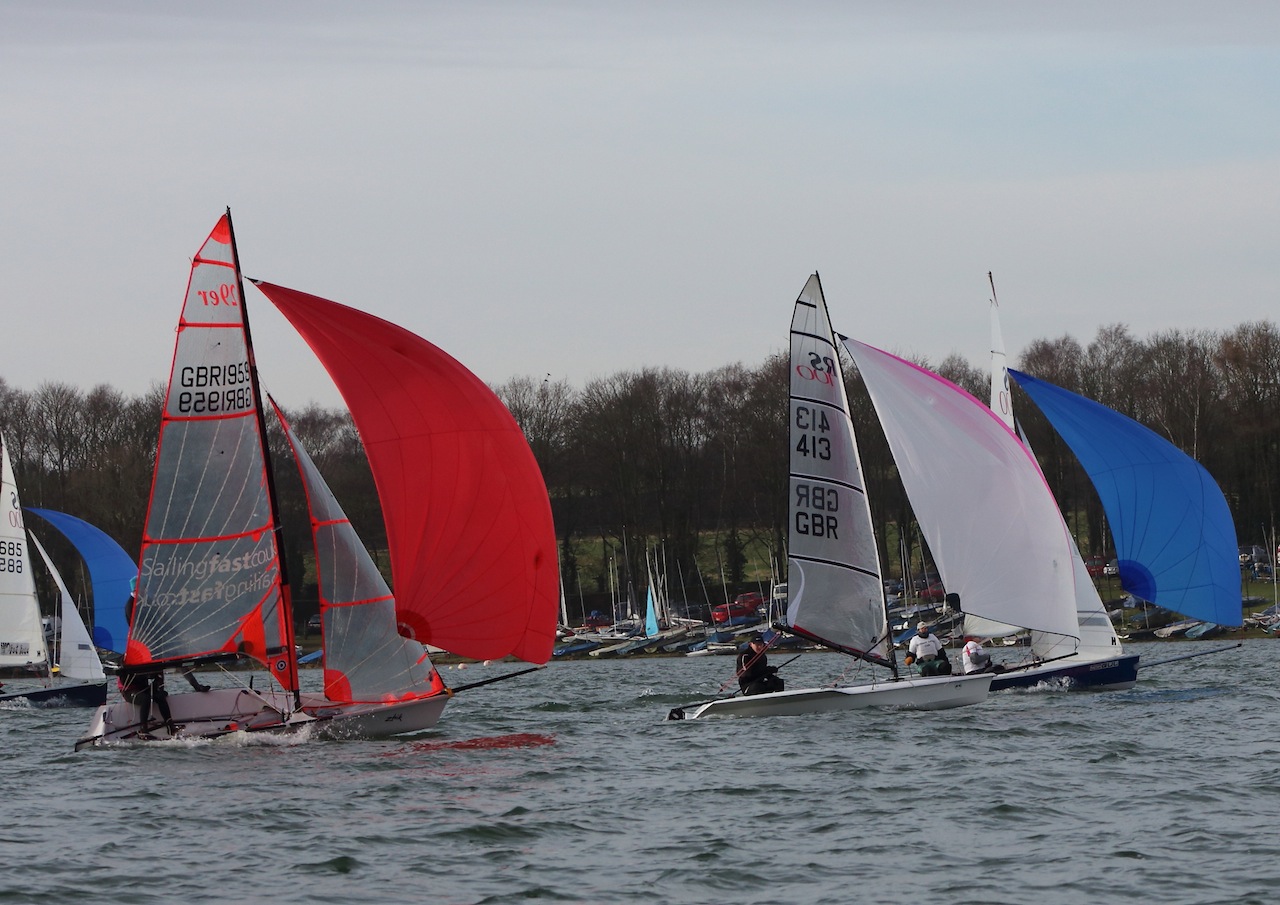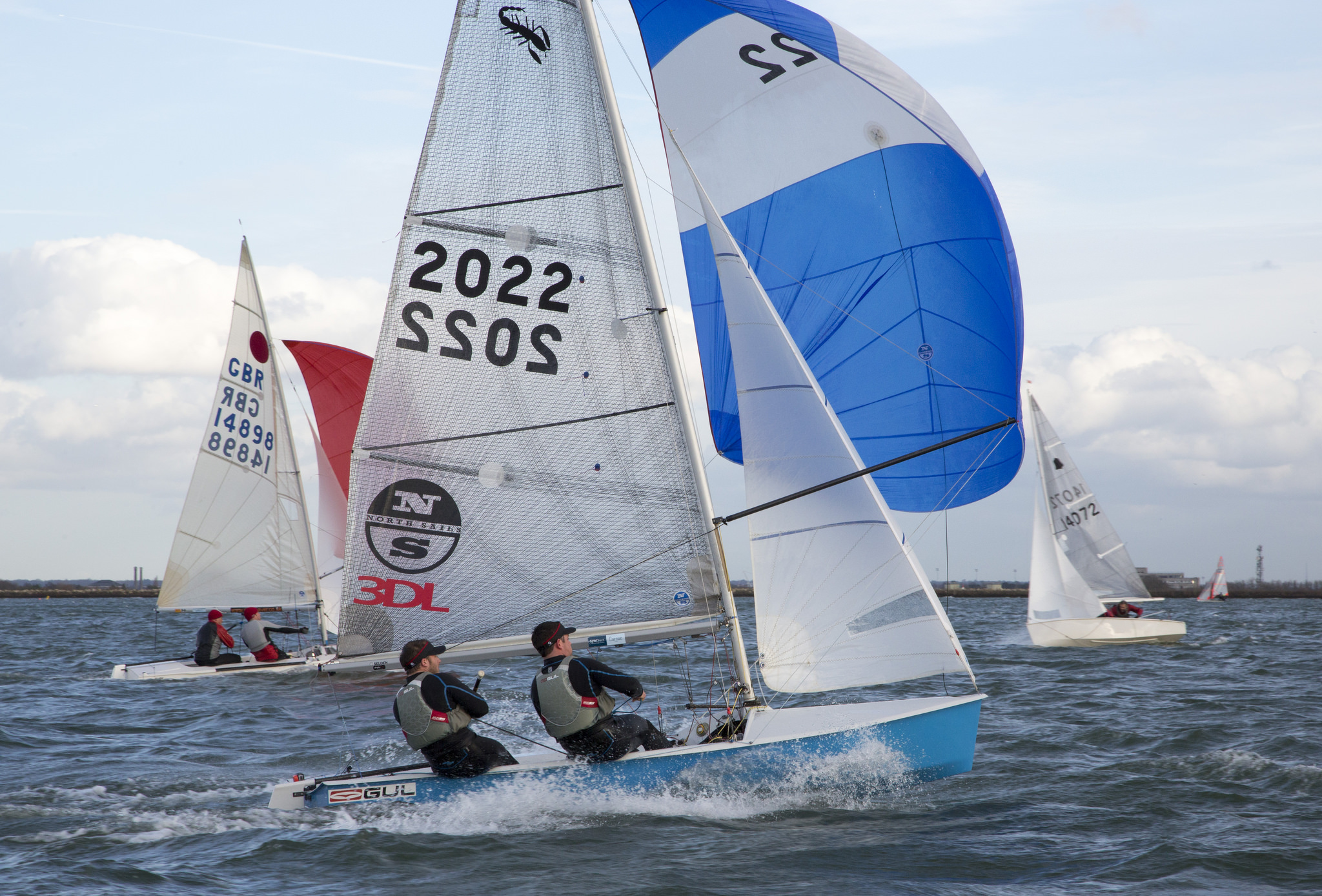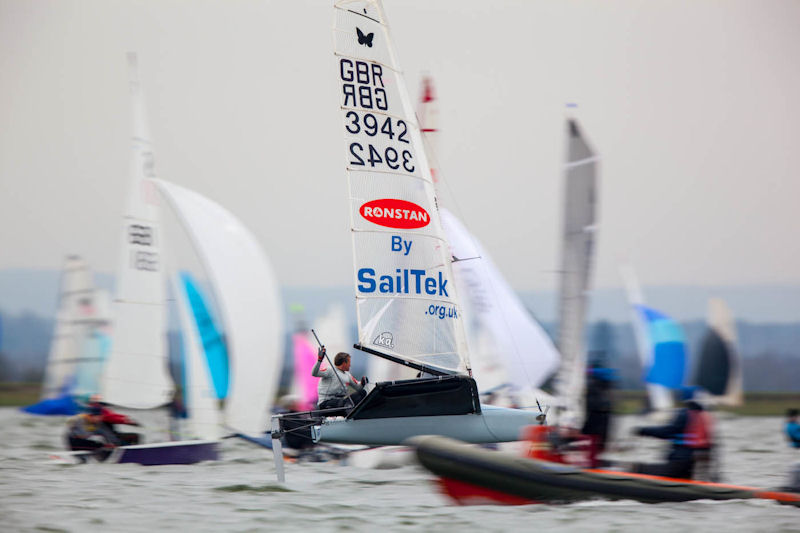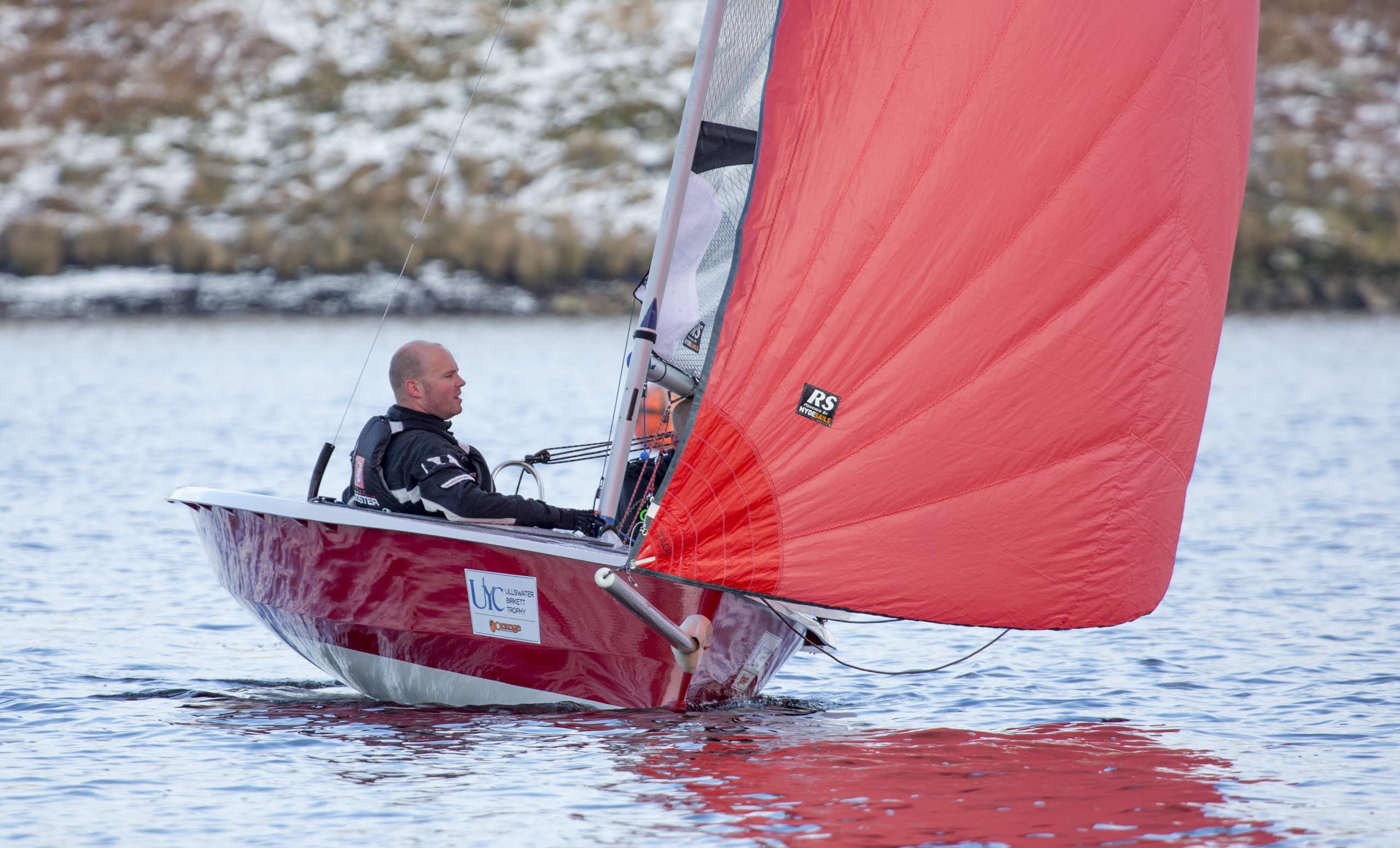Roll Tacks - March 2014
In the world of science, one individual is often credited as the originator of a great discovery or invention. Charles Darwin and his Theory of Evolution, for example, or Alexander Graham Bell and the Scotsman’s invention of the telephone. But was Darwin really the originator of his world-changing idea, or was it another feted British scientist of the day, Alfred Russell Wallace? And Bell’s telephone bore a remarkable resemblance to a device that had already been patented by American inventor Elisha Gray, resulting in a legal spat over who was first to picked up the telephone.
Just as the history of science is littered with examples of simultaneous invention, so too a similar concept occurs in the sailing world. Take, for example, the almost simultaneous emergence of the Musto Skiff and the RS700. Until the foiling Moth, these were the ultimate singlehander, but perhaps a little too much of a handful for the average mortal put off by the notion of having to master a gennaker and trapeze at the same time. At almost the same moment, the developers of these two great boats reach a similar conclusion and decide to take away the trapeze but launch new asymmetrically powered singlehanders - the Devoti D-One and the RS100.
And now, a third such coincidence flows across the ether as both companies concurrently conclude that for many sailors they would actually prefer a singlehander that has neither a trapeze nor a gennaker, but a simple hiking boat with a sail. In this reverse Theory of Evolution, sailing boats are becoming less complex, going back to basics. So, enter the the RS Aero and Devoti D-Zero. The A to Z of singlehanded sailing for the 21st century, two ideas so similar that they almost end up with the same name.
When two companies are so aligned in their thinking, perhaps they should actually combine forces and work together to promote themselves in tandem. That way, they could stand a chance of taking on the big daddy of singlehanded sailing, the Laser, which itself is going through somewhat of an identity crisis with the boat’s designer Bruce Kirby rebranding it as a Torch. Then there is the Solo, a 1956 Jack Holt-design which seems to be going through a renaissance, the latest evidence of which is the launch of the Boatyard at Beer Solo on the Rooster Sailing stand at the RYA Suzuki Dinghy Show, at an introductory price of £6750.
That price, by the way, is somewhat more than the D-Zero which was launched at Alexandra Palace for £5495, a discount of £980 on the standard price. The D-Zero originates from the Punk, developed by former Laser national champion Dan Holman who raced his prototype to 3rd place in the Bloody Mary a few years back. A bit like when that former bête noire of the British establishment, Sex Pistol Johnny Rotten did TV adverts for Country Life butter, the Punk has gone all respectable and upmarket as it has become rebranded under the Devoti banner.
Although the RS Aero launched at the Show without a stated price, RS says it has already taken half of the first 100 orders which are being offered at a discount. RS says: “Despite being half the weight, built using epoxy resin and significant amounts of carbon fibre in the hull and all-carbon spars, the price will be close to that of a Laser.” That would put the price around £5,000, which would be impressive indeed. The marketing for the RS Aero makes no secret of its desire to be seen as a Laser for the 21st century. The price of a Laser, but at 30kg hull weight, the weight of an Optimist.
Now, that is progress, certainly in technical terms. As to whether you believe the sailing world really needs another alternative to the Laser, Solo or any of the other well-established singlehanders, well that’s another matter. Then again, it’s not the boatbuilders’ role or responsibility to do anything other than make a living. It’s tough enough to make a profit in the marine trade without imposing other restrictions on yourself. I am a fan of one-design racing and believe clubs should encourage the growth of particular club fleets without ostracising those who want to sail in something different. But the fact is we are operating in an increasingly diluted dinghy scene. It’s why I started the GJW Direct SailJuice Winter Series, for which we saw 95 different classes represented this past winter. It’s why I welcome the launch of another handicap travellers circuit, the Garmin Summer Series.
Would I prefer to see more sailors competing in fewer classes? Yes. But on the other hand the diversity and competition between different builders keeps technical development moving forwards and stops prices going sky high. Great Britain is a powerhouse of small-boat innovation, as anyone who visited a bustling Alexandra Palace will have seen.
As a Musto Skiff sailor, I would love to see us hold joint open meetings with RS700s. We’re virtually the same speed around the race course, doing exactly the same style of racing. Maybe the RS Aero and D-Zero could do the same thing, but I’ll eat my hat if it happens. The forums will crackle with irrelevant hissing contests about which of the two boats is faster. I mean, really, who cares? They both come from good homes. Just enjoy these boats for what they are. If you really want to go faster, put an asymmetric on it, and why not a trapeze too?
Just as the history of science is littered with examples of simultaneous invention, so too a similar concept occurs in the sailing world. Take, for example, the almost simultaneous emergence of the Musto Skiff and the RS700. Until the foiling Moth, these were the ultimate singlehander, but perhaps a little too much of a handful for the average mortal put off by the notion of having to master a gennaker and trapeze at the same time. At almost the same moment, the developers of these two great boats reach a similar conclusion and decide to take away the trapeze but launch new asymmetrically powered singlehanders - the Devoti D-One and the RS100.
And now, a third such coincidence flows across the ether as both companies concurrently conclude that for many sailors they would actually prefer a singlehander that has neither a trapeze nor a gennaker, but a simple hiking boat with a sail. In this reverse Theory of Evolution, sailing boats are becoming less complex, going back to basics. So, enter the the RS Aero and Devoti D-Zero. The A to Z of singlehanded sailing for the 21st century, two ideas so similar that they almost end up with the same name.
When two companies are so aligned in their thinking, perhaps they should actually combine forces and work together to promote themselves in tandem. That way, they could stand a chance of taking on the big daddy of singlehanded sailing, the Laser, which itself is going through somewhat of an identity crisis with the boat’s designer Bruce Kirby rebranding it as a Torch. Then there is the Solo, a 1956 Jack Holt-design which seems to be going through a renaissance, the latest evidence of which is the launch of the Boatyard at Beer Solo on the Rooster Sailing stand at the RYA Suzuki Dinghy Show, at an introductory price of £6750.
That price, by the way, is somewhat more than the D-Zero which was launched at Alexandra Palace for £5495, a discount of £980 on the standard price. The D-Zero originates from the Punk, developed by former Laser national champion Dan Holman who raced his prototype to 3rd place in the Bloody Mary a few years back. A bit like when that former bête noire of the British establishment, Sex Pistol Johnny Rotten did TV adverts for Country Life butter, the Punk has gone all respectable and upmarket as it has become rebranded under the Devoti banner.
Although the RS Aero launched at the Show without a stated price, RS says it has already taken half of the first 100 orders which are being offered at a discount. RS says: “Despite being half the weight, built using epoxy resin and significant amounts of carbon fibre in the hull and all-carbon spars, the price will be close to that of a Laser.” That would put the price around £5,000, which would be impressive indeed. The marketing for the RS Aero makes no secret of its desire to be seen as a Laser for the 21st century. The price of a Laser, but at 30kg hull weight, the weight of an Optimist.
Now, that is progress, certainly in technical terms. As to whether you believe the sailing world really needs another alternative to the Laser, Solo or any of the other well-established singlehanders, well that’s another matter. Then again, it’s not the boatbuilders’ role or responsibility to do anything other than make a living. It’s tough enough to make a profit in the marine trade without imposing other restrictions on yourself. I am a fan of one-design racing and believe clubs should encourage the growth of particular club fleets without ostracising those who want to sail in something different. But the fact is we are operating in an increasingly diluted dinghy scene. It’s why I started the GJW Direct SailJuice Winter Series, for which we saw 95 different classes represented this past winter. It’s why I welcome the launch of another handicap travellers circuit, the Garmin Summer Series.
Would I prefer to see more sailors competing in fewer classes? Yes. But on the other hand the diversity and competition between different builders keeps technical development moving forwards and stops prices going sky high. Great Britain is a powerhouse of small-boat innovation, as anyone who visited a bustling Alexandra Palace will have seen.
As a Musto Skiff sailor, I would love to see us hold joint open meetings with RS700s. We’re virtually the same speed around the race course, doing exactly the same style of racing. Maybe the RS Aero and D-Zero could do the same thing, but I’ll eat my hat if it happens. The forums will crackle with irrelevant hissing contests about which of the two boats is faster. I mean, really, who cares? They both come from good homes. Just enjoy these boats for what they are. If you really want to go faster, put an asymmetric on it, and why not a trapeze too?
Related Articles

Steve Nicholson Trophy: Return of the Apocalypse?
 The 151 boats entered for the Steve Nicholson Memorial Trophy are looking at a windy forecast for this Saturday’s handicap contest at Northampton Sailing Club...
The 151 boats entered for the Steve Nicholson Memorial Trophy are looking at a windy forecast for this Saturday’s handicap contest at Northampton Sailing Club...
Read More

Late switch proves Bloody fortuitous for Gillard and Anderton
Read More
 Tom Gillard & Richard Anderton’s change of horse from Five-Oh to Fireball pays dividends at a blustery Bloody Mary
Tom Gillard & Richard Anderton’s change of horse from Five-Oh to Fireball pays dividends at a blustery Bloody Mary

Rob Greenhalgh takes the 40th Bloody Mary
Read More
 Following a record advance entry the gusting winds and chilly conditions excited more to venture out and a monster 340 boats took to the water. Officially the Virtual Rigger 40th Bloody Mary Pursuit was the largest race since 2000.
Following a record advance entry the gusting winds and chilly conditions excited more to venture out and a monster 340 boats took to the water. Officially the Virtual Rigger 40th Bloody Mary Pursuit was the largest race since 2000.

Great Ball of Fire at the Brass Monkey
Read More
With the 2012 Brass Monkey at Yorkshire Dales SC being part of the GJW Direct Sailjuice Winter Series, a bumper entry was expected, and sure enough entries had to be closed as capacity was reached weeks before the event date.

RS400 wins a cold, light Brass Monkey
 Chris Pickles & Matt Sharman narrowly beat a Scorpion to win at a chilly, light airs Yorkshire Dales...
Chris Pickles & Matt Sharman narrowly beat a Scorpion to win at a chilly, light airs Yorkshire Dales...
Read More
 Chris Pickles & Matt Sharman narrowly beat a Scorpion to win at a chilly, light airs Yorkshire Dales...
Chris Pickles & Matt Sharman narrowly beat a Scorpion to win at a chilly, light airs Yorkshire Dales... 